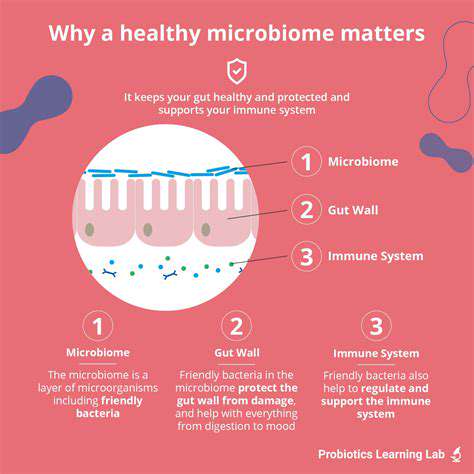Understanding Digestive Health: Probiotics and Prebiotics

Exploring the World of Probiotics

Understanding Probiotics
Probiotics are live microorganisms, similar to beneficial bacteria found naturally in our gut. These beneficial bacteria play a crucial role in maintaining a healthy digestive system, and their consumption can potentially offer a multitude of health benefits. Understanding how probiotics work and their impact on the body is essential for making informed decisions about their use. Many studies have investigated the positive effects of probiotics on various health conditions, such as digestive issues and immune function.
These microorganisms, when consumed in adequate amounts, can positively influence the balance of gut flora, contributing to a healthier microbiome. The impact of probiotics on the gut microbiome is a complex and active area of research, with ongoing studies exploring the specific mechanisms and effects of different strains of probiotics on various aspects of health.
Types of Probiotics and Their Benefits
A wide array of probiotic strains are available, each with potentially unique benefits. Some common types of probiotics include Lactobacillus and Bifidobacterium species. These bacteria are often found in fermented foods, such as yogurt and kefir, and are also available in supplement form. Research continues to explore the specific benefits of different strains, and the ideal amounts for optimal health outcomes.
Different probiotic strains may target different areas of the digestive tract or have varying effects on the immune system. Understanding the specific benefits and potential side effects associated with different types of probiotics is crucial for personalized dietary choices. Research suggests a potential correlation between probiotic consumption and improved digestion, reduced inflammation, and enhanced immune response.
Probiotics and Digestive Health
Probiotics are frequently touted for their potential to improve digestive health. They can help restore balance to the gut microbiome, potentially alleviating symptoms of conditions like irritable bowel syndrome (IBS) and other digestive disorders. Maintaining a healthy gut microbiome can influence nutrient absorption and overall digestive function, ultimately impacting overall well-being. Many individuals find relief from digestive discomfort and improved regularity with the inclusion of probiotics in their daily routine.
By promoting the growth of beneficial bacteria and inhibiting harmful bacteria, probiotics may aid in reducing the occurrence of digestive issues. The exact mechanisms by which probiotics exert these effects are still being studied, but their positive impact on digestion is becoming increasingly evident in numerous clinical trials and observational studies.
Probiotics and Beyond Digestive Health
While probiotics are often associated with digestive health, research also explores their potential benefits beyond the gut. Some studies suggest a possible link between probiotic consumption and enhanced immune function, potentially reducing the risk of infections and boosting overall health. Further investigation into these potential benefits is ongoing.
The potential role of probiotics in improving mental health is also an area of active research. Some preliminary studies have shown promising results, linking probiotic consumption to improvements in mood and reducing symptoms of anxiety and depression. However, more robust research is needed to definitively establish these connections.
Combining Probiotics and Prebiotics for Maximum Impact
Synergy in Action
Combining probiotics and prebiotics offers a synergistic approach to gut health, leveraging the strengths of both for optimal results. Probiotics are live microorganisms that, when consumed in adequate amounts, confer a health benefit on the host. These beneficial bacteria thrive in a supportive environment, and prebiotics act as the fuel for this thriving ecosystem. Essentially, prebiotics are non-digestible food ingredients that selectively stimulate the growth and/or activity of beneficial bacteria in the colon. This creates a positive feedback loop, where the prebiotics nourish the probiotics, and the probiotics further enhance the health of the digestive system.
This symbiotic relationship is critical for maintaining a balanced gut microbiome, which is essential for overall well-being. A healthy gut microbiome plays a vital role in digestion, nutrient absorption, immune function, and even mental health. By providing the right environment for beneficial bacteria to flourish, the combination of probiotics and prebiotics can contribute to a more robust and resilient gut, improving digestion, reducing bloating, and potentially alleviating various digestive issues.
Targeted Approaches for Specific Needs
Understanding the specific needs of your digestive system can further enhance the effectiveness of combining probiotics and prebiotics. Different individuals may benefit from different strains of probiotics and types of prebiotics, depending on their unique gut microbiome composition and specific health concerns. For example, someone experiencing digestive discomfort might find specific probiotic strains particularly helpful in restoring balance, while others may benefit from prebiotics that selectively nourish beneficial bacteria known to improve regularity.
Careful consideration of the specific needs of the digestive system can lead to a tailored approach, resulting in more effective and targeted support. Research into the specific actions of different probiotic and prebiotic combinations can help guide personalized choices. This personalized approach is key to maximizing the benefits of this powerful combination for improving overall digestive health.
Furthermore, understanding the science behind the interactions between these two types of compounds is essential. Research continues to explore the specific mechanisms by which probiotics and prebiotics work together, offering new insights into how to optimize their use for improved digestive well-being. This ongoing research allows for a more informed and targeted approach to supporting gut health through these beneficial compounds.
By focusing on the types of probiotics and prebiotics most likely to support your specific gut health needs, you can maximize the benefits of this powerful duo for improving digestion and overall well-being.
Consulting with a healthcare professional can provide personalized guidance on the most appropriate combination of probiotics and prebiotics for your individual needs.
- Cooking for Special Diets: Allergies and Intolerances
- Simple Ground Beef Chili: Hearty and Flavorful
- Sustainable Grocery Shopping: Eco Friendly Choices
- Vegetarian Lunch Sandwiches: Creative and Delicious
- Quick & Easy Lunches: Delicious and Nutritious
- Vegetarian Dinner Ideas: Meatless Meals for Every Day
- How to Store Fresh Seafood: Keep It Safe
- Authentic Vietnamese Spring Roll Sauce: Nuoc Cham
- Understanding Healthy Snacking for Kids: Smart Choices
- Exploring Polish Cuisine: Bigos and More
- Exploring Japanese Desserts: Mochi and Dorayaki
- Understanding Healthy Hydration: Beyond Water